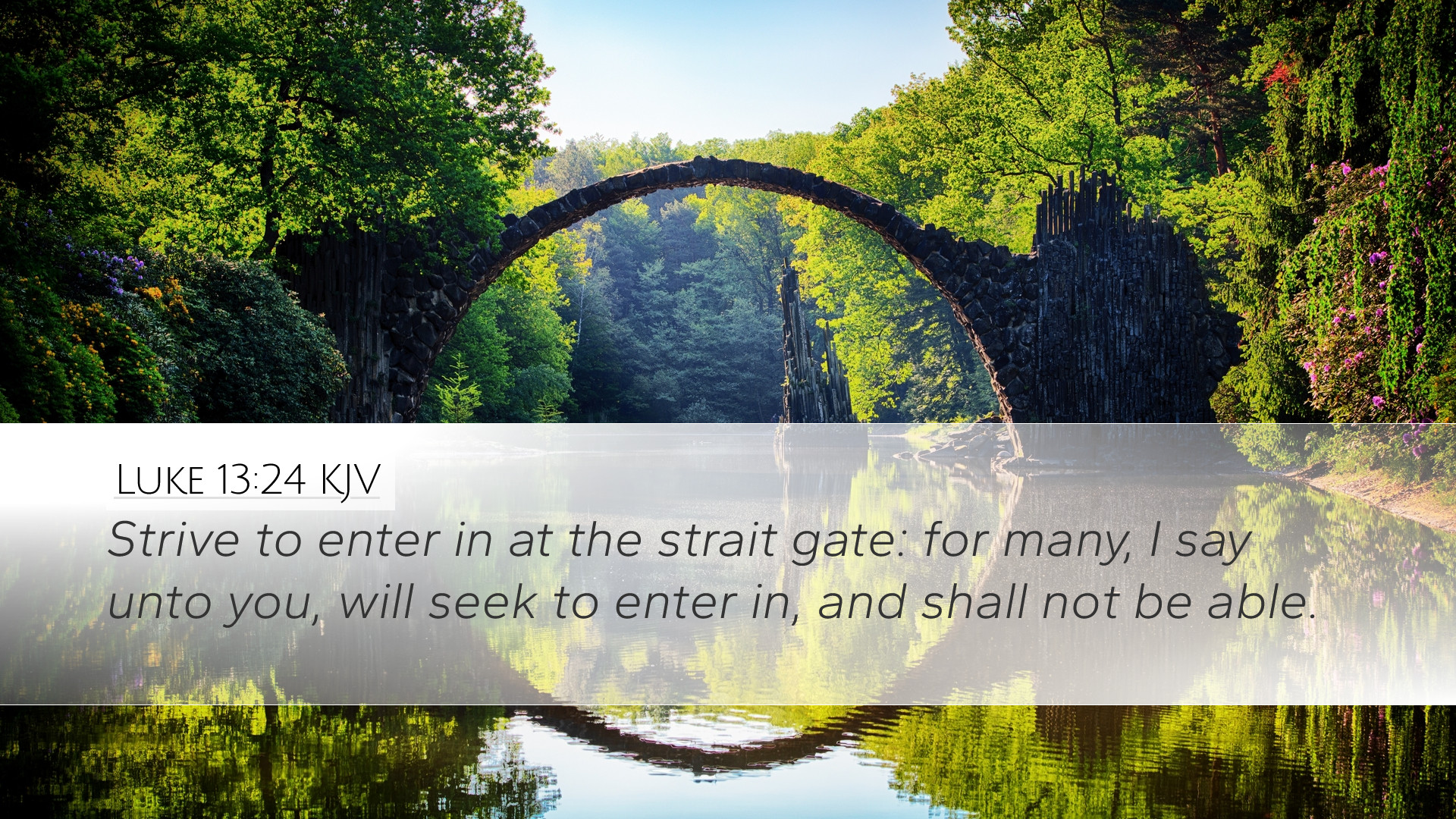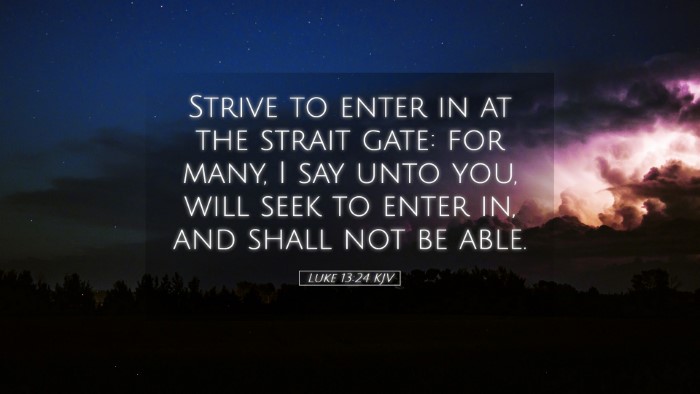Commentary on Luke 13:24
"Strive to enter in at the strait gate: for many, I say unto you, will seek to enter in, and shall not be able."
This verse appears in the context of Jesus' teachings regarding salvation and the kingdom of God. It stands as an urgent call to action, prompting both an introspective and communal examination of one’s spiritual state.
General Overview
The call to "strive" indicates a vigorous effort to pursue a goal that is not easily attainable. The metaphor of a "strait gate" suggests not only a narrow entrance but also one that requires careful navigation and persistence. The verse warns about the challenges and obstacles one may face in seeking entry into the kingdom of God.
Insights from Matthew Henry
- Striving vs. Effort: Matthew Henry emphasizes that striving is not passive; it requires intention and effort. Faith and works must coexist in the pursuit of salvation.
- The Strait Gate: Henry interprets the strait gate as the means through which believers must enter God’s kingdom. It represents the way of Christ, often misunderstood or rejected by many.
- The Warning: The phrase "many will seek to enter in, and shall not be able" serves as a sobering reminder that not all who wish for salvation will attain it. This reflects on the notion that acceptance into the kingdom is both conditional and profound.
Insights from Albert Barnes
- Active Pursuit: Barnes underscores that "striving" indicates active participation in one’s salvation, suggesting that lazy or complacent faith is insufficient.
- The Nature of the Gate: He elaborates on the "strait gate" as representing the rigorous demands of the Gospel, which can lead to discomfort and challenge. It is a gate marked by trials and tribulations, yet leads to eternal life.
- Reflective Understanding: Barnes notes that Christ's teaching draws attention to the realization of many who presume they are entitled to salvation without genuine commitment.
Insights from Adam Clarke
- Spiritual Warfare: Clarke describes striving as akin to spiritual warfare, where the believer must contend against sin, self, and the world, invoking the need for divine assistance.
- Interpretation of 'Many': He provides an insightful reflection on who the "many" might be, suggesting they could include those who are religious but complacent, failing to grasp the seriousness of the Gospel.
- Accessibility of Salvation: Clarke emphasizes that while the gate is strait, it is not exclusive. All are invited, but they must approach in the right spirit and through Christ alone.
Theological Reflections
The theological implications of this verse are profound. It challenges the believer's understanding of grace, works, and the reality of salvation. The narrative encourages theological debate around the tension between God's sovereignty in salvation and human responsibility.
The Impact of the Strait Gate
The strait gate symbolizes the unique path of discipleship that Jesus embodies. It is through Him that believers enter the kingdom, and this exclusivity must be acknowledged in a pluralistic society. It prompts believers to examine their hearts and to ensure they are genuinely engaging with their faith.
Practical Applications for Believers
- Self-Examination: Pastors and leaders should encourage congregants to engage in deep self-reflection about their spiritual lives and the validity of their faith journey.
- Evangelistic Urgency: The verse serves as a call to evangelism, demonstrating the necessity of sharing the fullness of the Gospel in light of the serious implications for those who are unaware of the narrow path.
- Community Accountability: The church should foster environments that promote accountability among believers, emphasizing the need for mutual encouragement in striving toward holiness.
Conclusion
In conclusion, Luke 13:24 serves as a vital verse for Christians, compelling them to engage seriously with their faith. The combination of striving, the strait gate, and the solemn warning against presumption produces a rich tapestry of understanding about the nature of salvation. For pastors, students, theologians, and scholars, this verse offers a platform for ongoing study and reflection on the gospel's demands and the nature of true discipleship.


